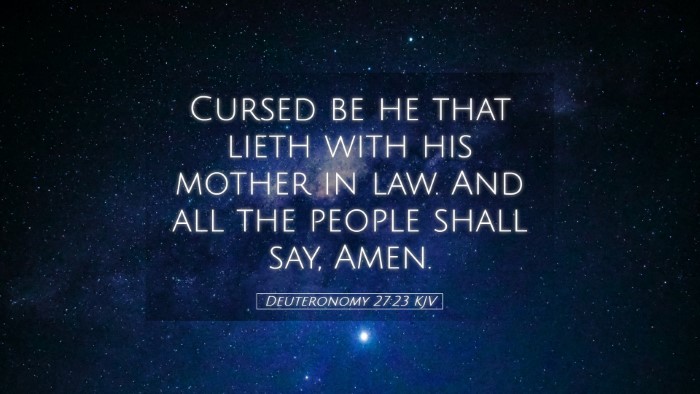Commentary on Deuteronomy 27:23
Verse: "Cursed be he that lieth with his mother in law. And all the people shall say, Amen." (Deuteronomy 27:23)
Introduction
The verse Deuteronomy 27:23 is part of a series of curses outlined in the law which the Israelites were to pronounce. In this context, serious moral transgressions were met with divine cursing. This particular curse indicates the severity with which God views incestuous relationships, particularly those that disrupt familial structures.
Contextual Overview
This verse is situated in the larger context of Deuteronomy 27, which is known for outlining specific curses that the people of Israel were to agree upon (as represented by the ‘Amen’ following each curse). This collective agreement emphasizes community accountability and the seriousness of adhering to God's laws.
Historical Context
The Mosaic Law was given to the Israelites after their Exodus from Egypt as a covenant to govern their lives in the Promised Land. The laws included moral codes that were crucial for maintaining societal integrity and spiritual purity.
The Importance of the Family Structure
The family unit was central to ancient Israelite society and the well-being of the people. Lying with a mother-in-law not only transgresses physical boundaries but undermines the very fabric of family relationships. Thus, this prohibition emphasizes the sanctity and respect due to family ties.
Insights from Public Domain Commentaries
Matthew Henry’s Commentary
Henry emphasizes the following points:
- The Seriousness of Incest: He posits that this act is not only sinful but is indicative of a broader moral decay. Incest is explicitly condemned within the law as it destroys the sacredness of familial relationships.
- Community Response: The 'Amen' signifies collective responsibility. Henry highlights that moral decay affects the whole community, and thus all must be vigilant.
- Divine Judgment: The curse attached to this sin acts as both a deterrent and a statement of divine judgment. God's holistic view of sin includes not just personal transgressions but communal repercussions.
Albert Barnes’ Notes
Barnes offers deeper reflections on the implications of the verse:
- Moral Prohibitions: He delves into the importance of sexual morality in the context of the covenant community and notes that such relationships are a perversion of natural ties. This particular curse helps maintain moral boundaries.
- Litigation and Witness: Barnes explains that the Israelites were to witness to these curses which reinforces a covenantal relationship with God, as covenant involves both blessing for obedience and curses for disobedience.
- Communal Agreement: The call for a communal ‘Amen’ signifies unity in adherence to God’s commands, which Barnes argues is paramount for societal holiness.
Adam Clarke’s Commentary
Clarke provides a theological reflection on the verse:
- Theological Implications: Clarke discusses the gravity of sin as it relates to family integrity. He reinforces that acts of immorality essentially weaken the covenant promises made by God to His people.
- Societal Impact: He notes that acts such as these reflect a broader principle of maintaining ethical and moral purity for the community’s well-being. Engaging in such immoral acts brings about a curse that harms the entire nation.
- Call to Holiness: According to Clarke, the emphasis on these curses serves as a reminder of the high calling of holiness that Israel must pursue as a nation chosen by God.
The Importance of Divine Curses
The structure of blessings and curses within the Deuteronomic code serves a dual purpose. On one hand, it operates as a legal framework for societal adherence to God's commandments; on the other, it reiterates the need for a personal and communal relationship with God based on holiness and obedience. The curses outlined in this passage reflect God's intention for Israel to live distinct lives, reflecting His character.
Conclusion
Deuteronomy 27:23, with its specific and stark curse, acts as a poignant reminder of the importance of maintaining moral and ethical purity within the community. The reflections drawn from commentaries by Henry, Barnes, and Clarke emphasize how such laws were not merely rules, but manifestations of God's will for His people. They highlight the necessity for a community to engage with, promote, and uphold standards that reflect harmony with God's character and covenant.


